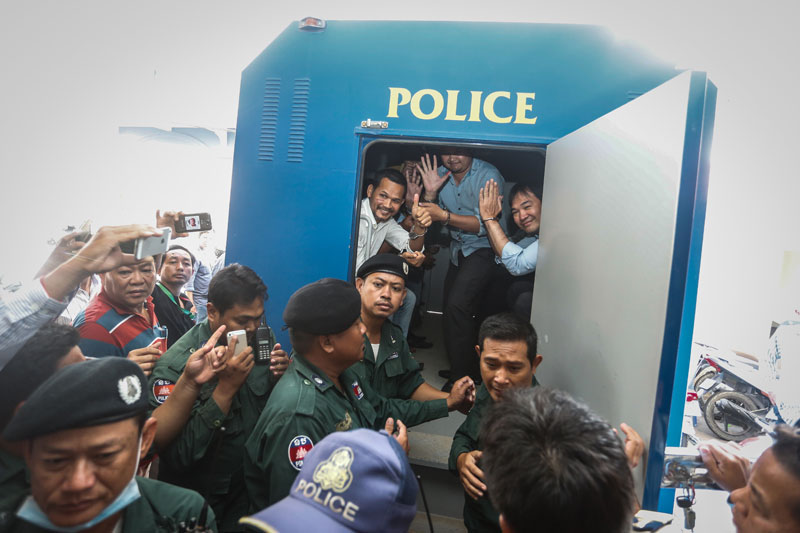If 2014 had ended as a year for hope in Cambodian politics, 2015 was the year it all went back to normal. Almost as if an omen for the eventual return to business as usual, the news on New Year’s Day was that Prince Norodom Ranariddh was back—again.
Ousted as leader of the royalist Funcinpec party in 2006 at the behest of Prime Minister Hun Sen, the prince said Mr. Hun Sen “played a clear role” in allowing his high-profile comeback. Clearly, the desires of the premier had shifted a decade on.
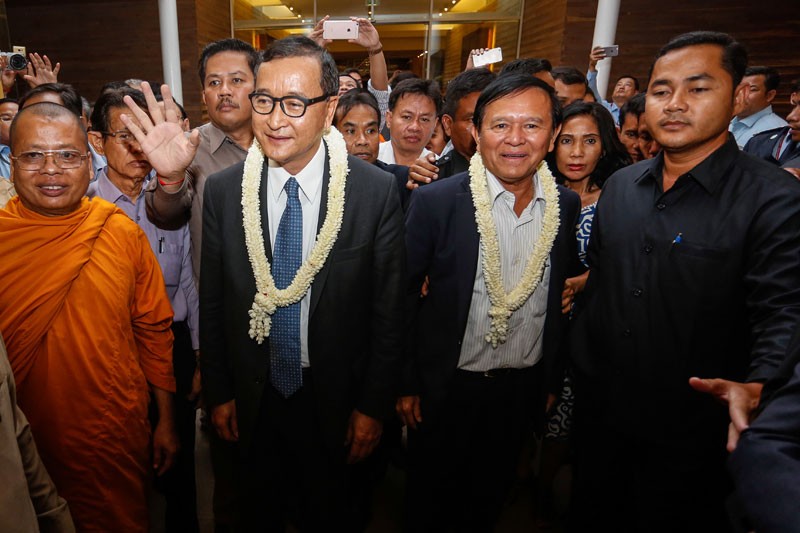
With opposition leader Sam Rainsy’s CNRP starting to show some staying power on the political scene, few had doubts about the motives surrounding Prince Ranariddh’s return as the Funcinpec president. Prince Sisowath Sirirath stated simply: “a solution has been imposed on us.”
“One thing I can say is that in the political geography we now have three major parties in Cambodia,” Prince Ranariddh said in a telephone interview two days later, during celebrations for his 71st birthday, “the CPP, the CNRP and the Funcinpec.”
Abusive Friendship
On January 14, 2015, Mr. Hun Sen marked 30 years since his official appointment as Cambodia’s premier. Over three decades, the prime minister has proven to be an adept maneuverer, and the Funcinpec ploy was just the opening salvo in a year of political machination aimed at weakening the CNRP.
Mr. Hun Sen has built a career on caressing his opponents’ egos when threatened, before crushing them when the time is right. To draw in Mr. Rainsy, Mr. Hun Sen pledged in 2014 to jointly create a new “culture of dialogue” in Cambodian politics.
For Mr. Rainsy, there seemed to be no choice but to heavily promote the agreement at the year’s start.
“The culture of war is being replaced with the culture of dialogue, which stems from the broader culture of peace. Even though we are facing some problems in this period of adjustment, we will not deviate from this culture of dialogue,” Mr. Rainsy told his 1 million Facebook followers in January.
As the CNRP attempted to publicize the accord, it appeared senior members of the ruling party were less than dedicated to the cause.
“Before, we protected [the government] by entering battles to stop the war but now it is not like that. However, we still must make our stance clear,” Defense Minister Tea Banh told top brass in a speech at the naval base in Phnom Penh on January 23.
“They gathered some people and started to attack and it started to heat up, so we have to fight back.”
Mr. Hun Sen, apparently not as wedded to the “culture of dialogue” as Mr. Rainsy, said in a speech the same day: “It’s OK now to start challenging each other without the culture of dialogue.”
“I want to be clear and send a message to His Excellency Sam Rainsy that the culture of dialogue is not efficient.”
Mr. Rainsy was unperturbed. “It is my role, I believe, to avoid any further confrontations,” the opposition leader said in response to Mr. Hun Sen and General Banh’s provocations.
“We may have misunderstandings and temporary setbacks, from one day to another, but the trend, I think, is on the right track,” Mr. Rainsy said. “Without a culture of dialogue, we will never achieve democracy.”
Despite Mr. Rainsy’s reassurances, it was an early signal that both parties were not equally invested in building up the nascent “culture.”
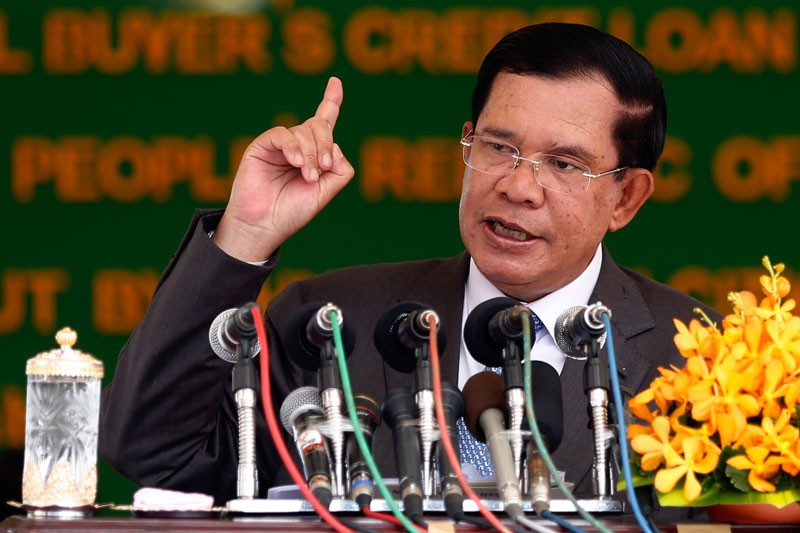
Dialogue, Divided
If the CPP’s top brass weren’t satisfied with the new turn politics had taken, many within the opposition were quietly grumbling as well.
In a rare insight into the internal politics of the CNRP—which has promoted unity above all else since its founding in 2012—deputy opposition leader Kem Sokha revealed in a speech he was not pleased with the deal that ended the CNRP’s boycott.
“The negotiations were on July 22, 2014, but the negotiations, for me, I was not happy with them, to speak frankly,” Mr. Sokha told supporters in California in the middle of March.
“I was not happy with the result of the negotiations, but I respected the CNRP’s policy and stance that it had to accept it in order to resolve the issues,” he said.
“We are patient, and we swallow gravel and rocks in order to continue to make our unity stronger and not be tricked by the dictatorial ruling party.”
Like clockwork, the ruling-party government produced and broadcast on television—at prime time—a documentary that accused Mr. Sokha of leading protests that were “equivalent to leading forces to carry out a coup d’etat to overthrow the legitimate government.”
Three days later, Mr. Sokha was summoned to the Phnom Penh Municipal Court for seven hours of questioning over his role in the CNRP’s protests after the 2013 national election, during which the opposition called for Mr. Hun Sen to resign.
Across the country at the Angkor Archeological Park in Siem Reap province, Mr. Rainsy and Mr. Hun Sen ingratiated themselves to one another, with the CNRP president appearing on stage alongside Mr. Hun Sen during a speech for Khmer New Year.
“Our country has reached a new point with the presence of His Excellency Sam Rainsy…on stage today,” Mr. Hun Sen said, turning to Mr. Rainsy. “The culture of dialogue has happened in Cambodia and replaced the culture of conflict and killing each other.”
Mr. Rainsy was effusive of his new relationship with Cambodia’s strongman, defending himself against claims the prime minister would soon turn on him—even if the pair had happily toured Khmer New Year exhibits around Angkor Wat like old friends.
“I used to hate Hun Sen as I would have hated any world’s tyrants,” Mr. Rainsy said in an interview in the days after his appearances with Mr. Hun Sen.
“But it has come recently to my mind that I should not hate anybody as a human being, as ‘bad’ as they may be, but I should only hate and combat the crimes that any ‘bad’ person has possibly committed,” he continued.
“When you are free from hatred you also become free from fear and this new freedom allows you to start doing things you would have never thought of, like engaging in a dialogue with your former worst enemy.”
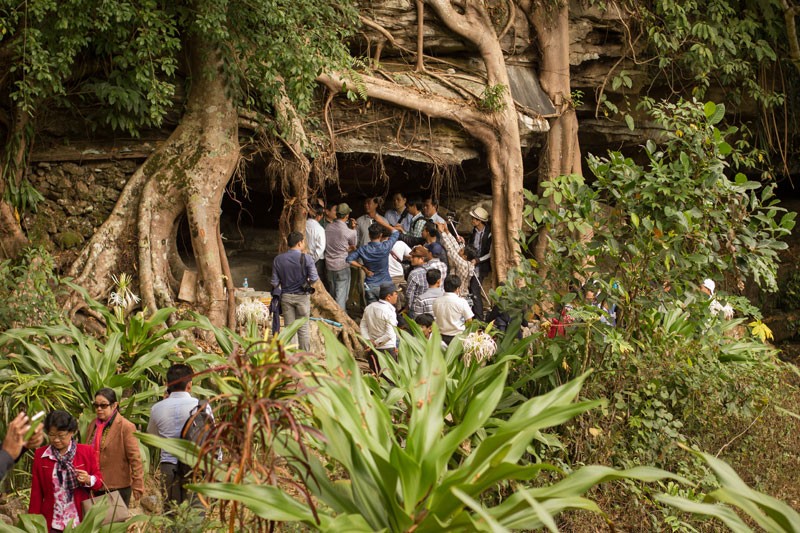
Good Fences Make Good Neighbors
While the uppermost echelons of the opposition party talked compromise, the lower levels fell back on their age-old agenda: the Vietnamese.
As early as February, the party had found a new direction for its ire as reports trickled out that Vietnamese citizens were making pilgrimages to the top of Kampot province’s Bokor mountain to pray (under portraits of Ho Chi Minh, no less) to ancestors who apparently died there.
Leading a delegation of 50 officials, party spokesman Yem Ponhearith—also the chair of the National Assembly commission on culture—made his way to the top of the mountain in a well-publicized mission.
Mr. Ponhearith’s trip would find no Vietnamese on the mountain but did find, deep in its forest, large stone graves and the remnants of what appeared to be elaborate ceremonies held in the days before, with local activists providing photographs of proceedings.
Back at the National Assembly in Phnom Penh, the opposition spokesman called on the minister of cults and religion to supplant the Vietnamese site with Buddhist statues to allow Cambodians to go there instead. The government demurred, citing freedom of religion.
While the ruling party could push back on some aspects of the opposition’s anti-Vietnamese tack, others were harder to quash.
In a series of increasingly high-profile journeys to the Vietnamese border over two months, CNRP lawmakers repeatedly uncovered incursions into Cambodian territory by Vietnamese civilians and soldiers.
The government scrambled, with Foreign Minister Hor Namhong issuing a series of strongly worded diplomatic letters to Hanoi demanding they pull back from the incursions and “respect the borderline.”
On June 28, CNRP lawmaker Real Camerin went to inspect a border area in Svay Rieng province where Vietnamese farmers were said to have taken up fallow Cambodian land as their own, in blatant violation of a major border post planted in the middle of their farm.
A brawl broke out between Mr. Camerin’s small delegation and the Vietnamese situated at the site in Kompong Ro district. Mr. Camerin said he was repeatedly beaten on his back with wooden poles in an area that was visibly on the Vietnamese side of border marker No. 203.
He announced a plan to return to the site the next month with thousands more CNRP supporters. The government balked at the plans but eventually said he could go if he limited it to 100 people on the final leg of the journey to see the border post.
On July 19, Mr. Camerin led 2,500 supporters from Phnom Penh to the site in a trip that started at 5 a.m.
“To [CNRP lawmaker] Um Saman and Real Camerin,” Mr. Rainsy wrote in an email sent out as the delegation arrived in Kompong Ro. “As I told you at our meeting yesterday afternoon and on the phone about 15 minutes ago, you should avoid any confrontation and any kind of violence.”
At the site, a line of Cambodian men armed with batons protected the border. Soldiers armed with AK-47 rifles stood behind them and made it clear that only 100 people would pass the final stretch to see post No. 203, which apparently demarcated the border.
Armed Vietnamese soldiers littered the final stretch but no violence broke out. Mr. Camerin and three other CNRP lawmakers climbed the post, and then called their supporters back to Phnom Penh.
The CNRP’s campaign on border incursions, which was coupled with claims the government was illegally using Vietnamese instead of French maps to demarcate the border, began to fizzle. A final push by the government was all that was needed for silence.
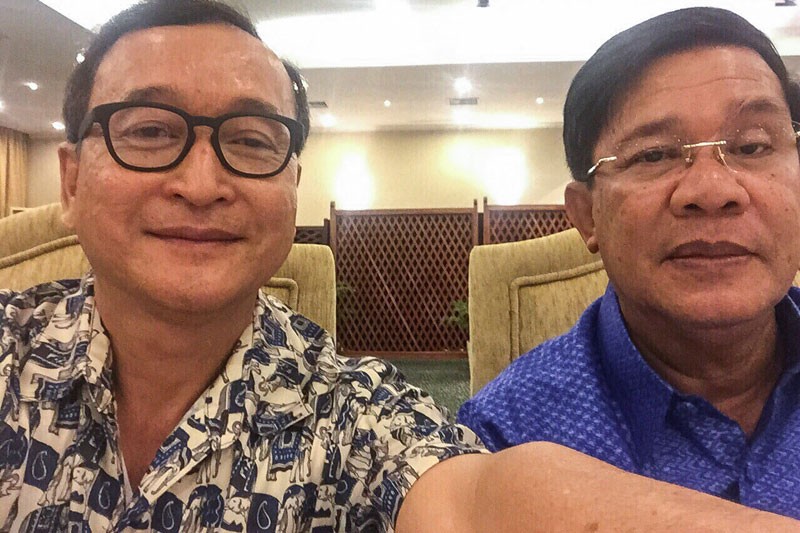
Arrested Development
The half-hearted attempts at partnership fizzled as well.
Two days after Mr. Camerin’s border trip, the Phnom Penh Municipal Court suddenly handed down guilty verdicts in the case against 11 CNRP activists charged with “insurrection” over brawls at a protest at Phnom Penh’s Freedom Park on July 15, 2014.
In a case that had dragged on for more than a year, Presiding Judge Lim Makaron took 10 minutes to sentence three of the activists to 20 years in prison for “leading an insurrection” and the other eight activists to seven years for “taking part in an insurrection.”
The opposition leader was under no allusions about the nature of the sudden and harsh sentences.
“This is a strong signal to the opposition: Don’t go to the border, and as long as we stop going to the border and creating tensions by exposing evidence, then it will be OK,” Mr. Rainsy said on July 26 from Luxembourg, after departing Phnom Penh the day of the verdicts.
“It is just to present a message. It may be embarrassing to recognize that the border issue is so sensitive that it has to be, quote, ‘resolved,’ without anyone but government officials involved,” he added.
The verdicts turned out to be merely an overture for what appeared to be a much longer campaign by Mr. Hun Sen to test Mr. Rainsy’s fealty to a “culture of dialogue” rife with attacks.
On August 13, Mr. Hun Sen complained during a public speech that he had been kept awake the night before by a video he watched on Mr. Rainsy’s Facebook page that showed opposition Senator Hong Sok Hour presenting a forged diplomatic treaty as real.
The treaty purported to show the 1980s People’s Republic of Kampuchea regime, for which Mr. Hun Sen served as foreign minister and then as prime minister, agreeing to dissolve the border between Vietnam and Cambodia.
Mr. Hun Sen ordered the senator’s arrest. At 6 a.m. two days later, Mr. Sok Hour was met outside a house in Phnom Penh by a heavily armed contingent of police and charged with forgery and incitement, despite his legal immunity from prosecution.
The Senate, which had the two-thirds CPP majority needed to strip Mr. Sok Hour of his immunity and allow the case to proceed, then met and decided it was not necessary to do so for the courts to jail him.
Citing a key exception in the Constitution for cases when a lawmaker is apprehended “in flagrante delicto” or red-handed, the CPP-controlled Senate allowed the case to proceed, arguing that the video of Mr. Sok Hour committing the crime constituted a red-handed offense that his immunity did not protect.
“This is an unconstitutional act that creates a precedent that the members of the parliament have no immunity at all, because now they can arrest anyone without lifting their immunity,” said Koul Panha, of the Committee for Free and Fair Elections in Cambodia.
On August 17, Mr. Rainsy ordered opposition lawmakers to end their Vietnam border campaign and work more constructively with Mr. Hun Sen’s ruling party.
“If we know they are sensitive, we won’t poke their waists, we will look for a [new] way. When we know they are sensitive, we have to be careful,” he said.
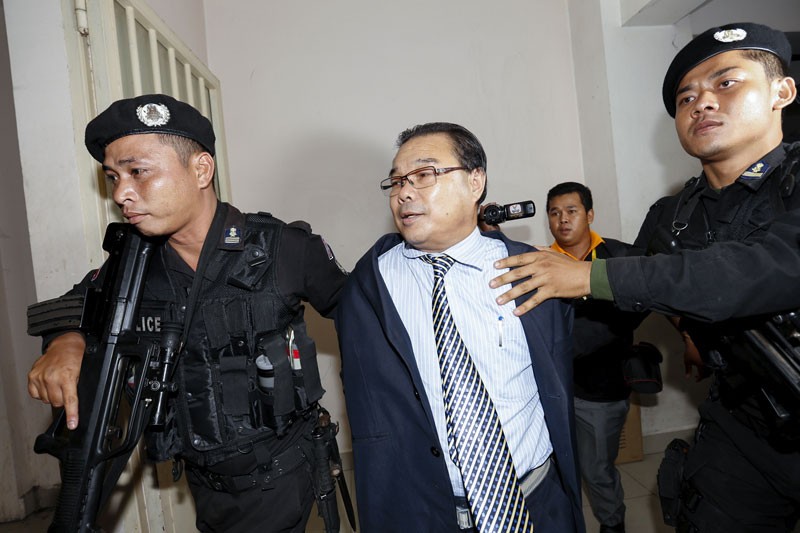
If You Can’t Beat ‘Em…
Mr. Hun Sen in early August announced that the next election, which was moved from July 2018 to February 2018 as part of the July 2014 deal, would go back to July 2018, ridiculing the CNRP for believing a promise that was never put in writing.
“Why?” Mr. Hun Sen asked of his decision to go back on a promise. “Because you are all stupid.”
Mr. Rainsy was unimpressed—openly attacking Mr. Hun Sen for the first time since the detente.
“Obviously there are people who ignore the meaning of the expression ‘My Word Is My Bond,’ even when their word has been heard by everybody,” Mr. Rainsy said in an email. “This tells a lot about their trustworthiness and their sense of honour.”
In September, Mr. Hun Sen used a speech at the Sokha Hotel in Phnom Penh to amp up his threats that a victory by the CNRP in the 2018 election would lead to war—a favorite rhetorical flourish.
“If voted in, [the CNRP says] it will solve this and that, but I dare say that the men here are its enemies,” Mr. Hun Sen told businessmen attending a September 22 event.
“All tycoons are its class enemies, and they would seize their hotels and give them to the poor,” Mr. Hun Sen goaded. “Would it be peaceful?”
“Of course, war will happen,” he concluded. “This point is a point that must be considered.”
Mr. Hun Sen’s threats were coupled with claims that Mr. Rainsy’s policies would render him no different to Pol Pot, and suggestions to Cham Muslims that a CNRP government could lead to them being massacred like under the Khmer Rouge.
Mr. Rainsy was prepared to play ball. The CNRP would, he vowed, establish “an independent tribunal dealing with land stolen from the poor, and there could be investigations in the future, conducted by an independent tribunal.”
“Hun Sen has some extremist ideas that he cannot get rid of,” he added.
Many expatriate Cambodians agreed. As Mr. Hun Sen made his way around the U.S. and France in the following months, Cambodians staged humiliating protests. The prime minister struck back.
“While there is going to be a protest here [in Paris], I also received a message from Phnom Penh asking to hold a protest tomorrow. Now how can I settle this problem?” Mr. Hun Sen announced from Paris on October 25.
“Tomorrow there will be a demonstration in Phnom Penh against the opposition party and to demand the removal of the deputy president of the National Assembly…because he got this position through a CPP vote, so he must be removed by a CPP vote.”
With the “culture of dialogue” by now little more than a farce, the protest against Mr. Sokha took place the next day in Phnom Penh. On the Thai border, Cambodian soldiers also rallied for Mr. Sokha’s removal.
The protest in Phnom Penh proceeded mostly peacefully outside the National Assembly, which was in session, until a group of thugs among the protesters dragged opposition lawmakers Nhay Chamroeun and Kong Saphea from their cars as they were leaving parliament and beat them bloody.
Mr. Rainsy blamed Mr. Hun Sen for organizing the beatings. Mr. Hun Sen, back in Cambodia, denied the claims in a televised speech, but reiterated that the protest was held in retaliation for the demonstrations that faced him in both New York and Paris.
Three soldiers turned themselves in and were arrested for the beatings a week later. No one else among the crowd of thugs has been arrested and officials said they had no idea which military units the three soldiers came from.
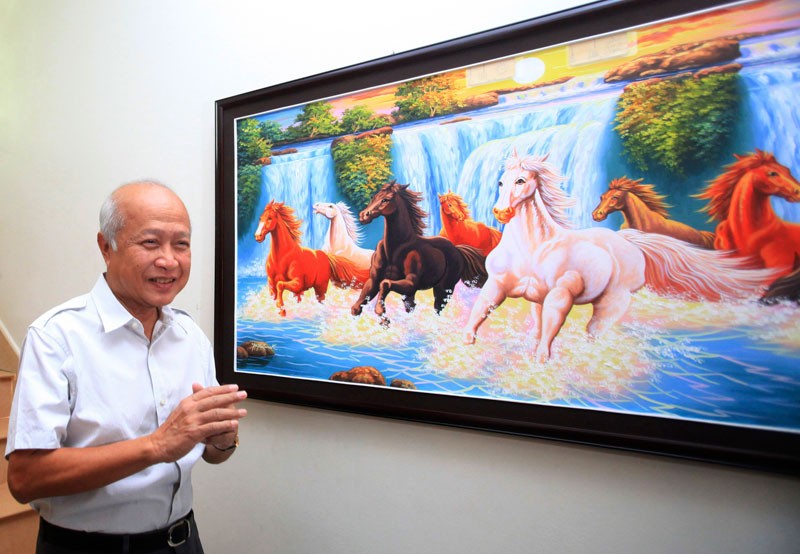
Mr. Rainsy Goes to Paris
With the public assault of the lawmakers, party politics had rapidly devolved to mirror the days of yore.
Just days after the beatings, the CPP-led National Assembly ousted Mr. Sokha as vice president in a session boycotted by the opposition’s other lawmakers. Supporters and legal analysts called the move illegal; the ruling CPP was unmoved.
Two weeks later, the ruling party upped the ante. The Phnom Penh Municipal Court issued an arrest warrant for Mr. Rainsy over a defamation case won by Mr. Namhong, the foreign minister, in early 2011.
In South Korea at the time, the opposition leader vowed he would face the two-year jail sentence head on.
“They are coming to catch Sam Rainsy. Is Sam Rainsy scared? No!” he shouted to a crowd of expatriate supporters. “Cambodia is my homeland and my motherland, and I absolutely have to come back in order to save our country.”
“My plans have not changed. Even if I die, it doesn’t matter, I will die as a Khmer and will not die serving the foreigners,” the opposition leader said.
It was not to be. Mr. Rainsy canceled his plans hours before his scheduled return. He promised to come in the coming days, then in the coming months. Before long, he began insisting: “It doesn’t help to go back just for the sake of it.”
“My physical presence is not indispensable. In this modern world, physical presence is not as important as communicating with the people on the front line,” he said. “I am coming back when there is a guarantee we can set about democratic change.”
Mr. Rainsy said in a radio interview last month that he would return in the weeks or months before the 2018 national election.
With Mr. Rainsy out of the country, the potential prison time racked up. Shortly after the initial arrest warrant, officials announced he was charged with being an accomplice to forgery and incitement in the case of Mr. Sok Hour.
Unlike in 2013, CPP officials made it clear that there would be no pardons for the opposition leader this time around.
“If I sign off [on a Royal Pardon] for a third time, I will cut off my right arm and throw it away,” Mr. Hun Sen said during a speech last week. “By doing so [not signing off], you will not be able to go out and cheat others.”
In the absence of Mr. Rainsy, Mr. Sokha returned to Cambodia alongside the two beaten CNRP lawmakers and assumed the acting presidency of the CNRP.
Prince Ranariddh, meanwhile, held a Funcinpec youth function on December 11, in which he treated 400 young supporters to breakfast and snacks and performed his own song and dance show.
Everything was back to normal.
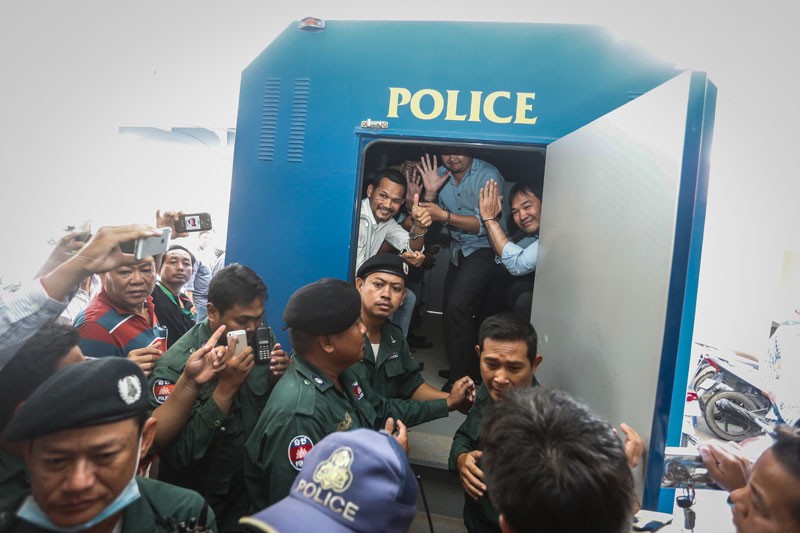
The Chance of a Lifetime
Surrendering his chance to come back and face Mr. Hun Sen—and his prison sentence—head-on, Mr. Rainsy gave up an opportunity to show that things have changed and that the 2018 election won’t be like the others.
Yet Mr. Rainsy still holds a potential trump card allowing him to return to Cambodia when he wishes and force Mr. Hun Sen to either arrest him or else back down, potentially shattering the facade of a threat from Mr. Hun Sen that has never been tested.
Mr. Hun Sen will hope that Mr. Rainsy stays away and allows him to govern the country over the next two-and-a-half years with the freedom he had during the opposition leader’s last period in exile.
The prime minister has given up much more and come back from much worse over his three decades in power. Mr. Rainsy, who has routinely fled Cambodia during that time, may have missed a singular opportunity to flip Mr. Hun Sen’s playbook on its face.
As Mr. Rainsy plays a game of wait-and-see, he continues to assume that anti-CPP resentment is resilient enough to bring his party victory in 2018 under a reformed, bipartisan National Election Committee.
But while Mr. Rainsy and Mr. Hun Sen play politics as usual, many Cambodians have begun to feel that is not enough.
In 2015 alone, seven new parties launched. Some are small and have barely made news, others were started by respected and popular members of civil society. Whether an anyone-but-CPP mentality will lead to a CNRP victory in 2018 is far from certain.

